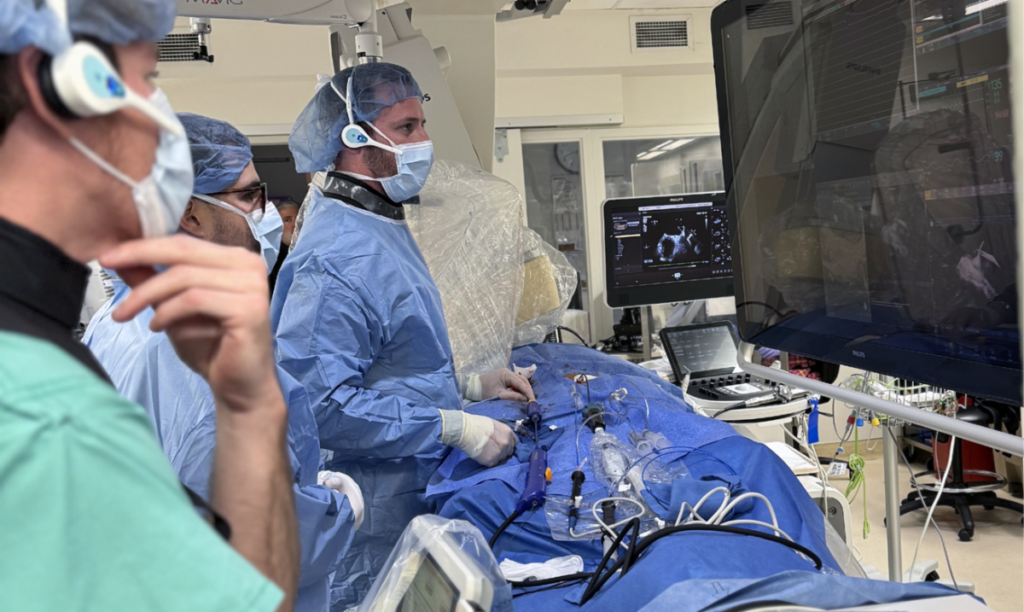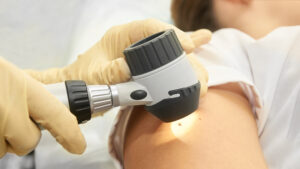Maimonides specialists pioneer AFib care after participating in a selective clinical trial for first pulsed-field ablation technology to receive FDA approval
Most primary care clinicians are aware of the serious risks of untreated atrial fibrillation (AFib), especially as patients reach older adulthood and their risk of developing the condition grows (1). Untreated, it can progress and impede the heart’s ability to pump enough oxygen-rich blood to the body, causing blood clots, stroke, heart failure, and other serious issues. It is the most common type of heart arrythmia, and it is estimated that the number of people in the United States with the condition will reach 12 million by 2030 (2).
Frontline AFib treatments commonly include blood thinners, heart rate medications, or heart rhythm medications, but medical treatments are not the only option. Maimonides Heart & Vascular Institute’s Heart Rhythm Center provides a variety of innovative medical, noninvasive, and minimally invasive options for atrial fibrillation management, providing a lifeline for patients at risk of serious complications due to cardiac arrhythmias.
Electrophysiology specialists at Maimonides have made significant strides in this constantly evolving field, especially for innovative AFib treatments. Most recently, Gregory Cunn, MD, cardiac electrophysiologist, led the first simultaneous procedure in Brooklyn combining two cutting-edge, minimally invasive AFib therapies: pulsed-field ablation and the Watchman™ Left Atrial Appendage (LAA) closure implant.
“Our commitment to excellence in cardiac care extends to the revolutionary pulsed-field ablation techniques and the Watchman device, both game-changing solutions designed to safeguard the future of patients with atrial fibrillation,” says Yisachar Greenberg, MD, Director of Electrophysiology and Pacing at Maimonides. “These therapies represent breakthroughs in medical technology, offering an alternative to open surgical procedures and an opportunity to abate the damaging progress of AFib.”
“Administering these treatments together in one procedure is a groundbreaking approach to treating atrial fibrillation,” says Dr. Cunn. “It lets us to address heart rhythm abnormalities, symptoms, and stroke risk associated with AFib, while at the same time allowing patients to stop blood thinners and eliminate the risk of severe — potentially life threatening — bleeding associated with these medications. Furthermore, by combining these two treatments into one procedure, we reduce the number of times a patient has to go under anesthesia, so they can return to their normal lives sooner.”
A Record of First-in-the-Nation Excellence in Novel AFib Treatment
Maimonides Heart & Vascular Institute clinicians possess unique expertise in cardiac electrophysiology and novel AFib treatment. In 2021, Maimonides Medical Center completed its participation in the SPHERE Per-AF Trial (3), a first-of-its-kind trial to treat persistent AFib using an ablation catheter. Maimonides was one of only 23 sites across the United States and Europe invited to participate in this trial, playing a key role in evaluating the safety and efficacy of the Sphere-9™ cardiac diagnostic and ablation catheter, the first of its kind to deliver both radiofrequency and pulsed field cardiac ablation therapies for the treatment of persistent AFib. In 2023, the system became the first pulsed-field ablation technology to receive FDA approval (4).
The patients enrolled in the SPHERE Per-AF Trial at Maimonides Medical Center were treated by clinical teams led by Dr. Greenberg. Being among a select group of clinicians administering these therapies through the trial, Maimonides cardiac electrophysiologists are among the most skilled in the U.S. in pulsed-field ablation, and continue to perform it successfully and safely for patients.
While ablation through heat or freezing have been practiced as methods of correcting abnormal electrical signals that cause atrial fibrillation for many years, pulsed-field ablation is distinguished by its novel irreversibleelectrocorporation mechanism of destroying tissue. Ablating tissue in the heart using electrical energy is safer than doing so with thermal energy sources, because it specifically targets pulmonary vein tissue.
“With the new technology available to improve ablation procedures, we’re visualizing ourselves live within the heart using an ultrasound, and we have 3-D mapping systems that allow us to see exactly where our catheter is within the heart,” says Dr. Cunn. “Rapidly improving technologies like these have helped the procedure become markedly safer and much more effective. It now requires even less time under anesthesia than it did in the past, and about 85% of people who get this procedure do not have any more atrial fibrillation at about one year (5). We envision that this year we will be able to start carrying out ablation procedures under sedation only, taking away the risks associated with general anesthesia and allowing patients to return to their daily lives even sooner.”
Prior to the SPHERE Per-AF Trial, Maimonides has achieved a record of leadership in this field, making the most cutting-edge therapies available to patients here in Brooklyn and across the nation. The Heart & Vascular Institute was also one of the few centers for the clinical trial of the hybrid convergent procedure, a multidisciplinary technique combining the expertise of electrophysiology cardiologists and cardiac surgeons performing cardiac catheter ablation and minimally invasive epicardial surgery.
Demonstrated Expertise in Minimally Invasive Watchman Implantation
Maimonides electrophysiologists have also been performing the Watchman implant procedure since 2016, and currently administer the procedure with the latest WATCHMAN FLX™ Pro Left Atrial Appendage Closure Device. The minimally invasive process involves passing a specialized catheter through the femoral vein into the heart. Then, an electrophysiologist guides the Watchman device through the catheter tube into the left atrial appendage to permanently close off that part of the heart. This prevents clots from escaping, thus reducing risk of stroke and eliminating the need for long-term anticoagulant medication.
“The Watchman device represents a breakthrough in medical technology, offering an alternative to open surgical procedures by expertly sealing the left atrial appendage. This innovative approach substantially reduces the risk of stroke, equivalent to the effectiveness of long-term anticoagulation or blood thinner therapy,” says Dr. Greenberg. “The impact on patients’ quality of life is profound as they bid farewell to the need for blood thinners, especially for those susceptible to the risks of long-term medication. Moreover, clinical evidence underscores the significant improvements in survival rates for patients who are liberated from the burden of blood thinners.”
Early Diagnosis and Treatment are Key
If patients are not receiving routine EKGs, diagnosing AFib can be challenging. Cases can often be asymptomatic and/or episodic, which causes this condition to be highly underdiagnosed.
“Many patients come in unaware that they’ve been in AFib for some time,” says Dr. Cunn. “The longer you are in AFib, the harder it is to get you out of AFib, and the more resistant it becomes to treatment.”
It’s important to be aware of subtle symptoms that patients may report, like fatigue and exercise intolerance,which may be a sign of underlying AFib and cause for further cardiac testing, or referral to a cardiologist or electrophysiologist.
Multidisciplinary Care for Each Patient’s Unique Needs
Dr. Greenberg attributes Maimonides’ excellent outcomes with this procedure to the Heart & Vascular Institute’s multidisciplinary approach. For our AFib and electrophysiology patients, a meticulously composed team of cardiac electrophysiologists, anesthesiologists, and echocardiographic specialists are dedicated to understanding each patient’s unique condition. Along with Maimonides’ interventional cardiologists, each member of the patient care team brings advanced expertise in treatment with these technologies.
“This collaborative effort ensures our entire team’s commitment to upholding the highest standards of patient care,” says Dr. Greenberg. “Our dedicated support staff at the Heart & Vascular Institute delivers this critical care with grace and a patient-oriented focus. We understand the importance of not just treating conditions, but also enhancing the overall well-being of our patients.”
This focus on individualized treatment, enhanced well-being, and achieving the highest quality of life possible in the face of such critical cardiac challenges, makes all the difference for Maimonides patients. From initial consultation to surgery, recovery, and follow-up care, patients can be assured they are in the best hands at Maimonides Heart & Vascular Institute. There is no team in Brooklyn — and few in New York — better equipped to carry out these procedures.
Learn more about Maimonides’ Heart Rhythm Center at https://maimo.org/treatments-care/heart-vascular-institute/heart-rhythm-center/. To refer a patient to a heart rhythm specialist, call (718) 283-7111.
- https://www.mayoclinic.org/diseases-conditions/atrial-fibrillation/expert-answers/atrial-fibrillation-age-risk/faq-20118478
- https://www.cdc.gov/heart-disease/about/atrial-fibrillation.html
- https://news.medtronic.com/2022-12-05-Medtronic-completes-enrollment-in-pivotal-trial-evaluating-first-of-its-kind-pulsed-field-ablation-catheter-for-patients-with-atrial-fibrillation
- https://news.medtronic.com/2023-12-13-Medtronic-creates-history-with-FDA-approval-of-its-novel-PulseSelect-TM-Pulsed-Field-Ablation-System-to-treat-atrial-fibrillation
- https://www.bostonscientific.com/en-US/products/catheters–ablation/farapulse/clinical-data.html




